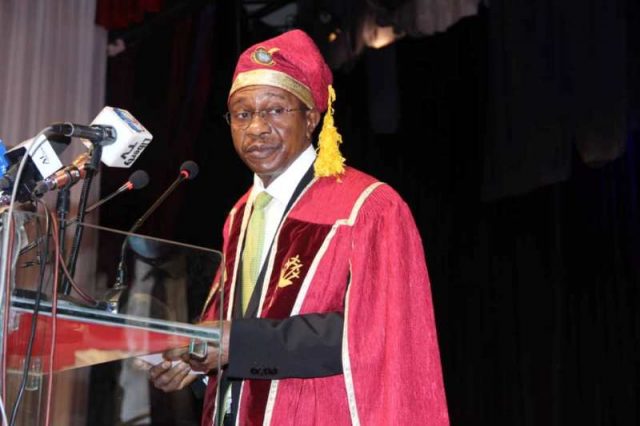By Issa Aremu
THUR 05 AUG, 2021-theGBJournal- The 11th second- term running Governor of the Central Bank of Nigeria (CBN) turns 60 Wednesday. As a sexagenarian myself, I bear witness to the significance of the gift of worthy six- decade life in an ever precarious world of insecurity and Covid:19 pandemic with its notorious Delta variant.
Emefiele’s inspiring profile is a delight of writers and members of commentariat alike.
There are enough positive word counts on the life and indelible landmarks of a multiple degrees holder in Finance and insurance, former lecturer at the first generation University of Nigeria Nsukka, an alumnus of Executive Education at Stanford University, Harvard University (2004) and Wharton School of Business (2005) and former Group Managing Director of a leading bank in Africa, Zenith Bank.
Emefiele was born on August 4, 1961 in Lagos. His parents originally hailed from Ika South, Agbor of Delta State. A confluence of “Center of Excellence” (Lagos) and a “Big heart” (Delta) makes a great compatriot in whom many Nigerians are at home with.
Young Emefiele attended primary education in Government Primary School, Victoria Island (formerly Ansar-U-Den Primary School, Igbosere), Lagos, before proceeding to Maryland Comprehensive Secondary School, Ikeja, Lagos.
Emefiele’s cosmopolitan disposition, humility, modesty, fairness to all and tenacity of policy purpose and focus point to the strength of multiple identities in a diverse Federal Republic like Nigeria. I agree with the American talk show host, television producer, author, and philanthropist, Oprah Winfrey that “The more you praise and celebrate your life, the more there is in life to celebrate.”
The essential Emefiele is an activist 11th CBN Governor (Bankers’ Banker) and Development Central Banker. Seven years after eventful activist independent central banking, Emefiele has cut a commendable clout as a Governor with an eye on the bigger picture of the economy.
He has remarkably balanced the Bank’s mandate of monetary and price stability, with the development objectives of national economy. In seven years, CBN has recorded significant successes with respect to price and financial stability and macro economics despite the pressures of centrifugal forces. First is his prompt agenda setting.
Appointed in 2014, by former President Goodluck Jonathan Emefiele in his inaugural speech espoused “Entrenching Macroeconomic Stability and a Engendering Economic Development in Nigeria.”
On reappointment by President Muhammadu Buhari he consolidated on the achievements of the first tenure through his popularized five-year policy thrust for another term of five years (2019-2024). Worthy praise goes to both former President Goodluck and President Muhammadu BUHARI for the statesmanship in appointment and retention respectively.
To serve under two Presidents, Emefele is a lesson in staying power and diligence. The CBN within the context of its enabling Act continues to maintain sound financial structure, promote monetary stability, safeguard the value of Naira and stable exchange rate, proving to be a financial adviser to the federal government in the areas of price and exchange rate management, development financing, building foreign reserves and employment creation.
On Exchange rate management, there have been creative interventionist measures which include flexible exchange rates (in interbank market) to multiple windows FX management for whole sale, invisible, small and medium enterprises (SME) and Investors/Exporters windows. Rate stability is the constant factor. Notwithstanding a sharp drop in crude oil prices, and reduction in Nigeria’s oil production quota, as well as the significant decline in government revenue and foreign exchange earnings as a result of the impact of two recessions in quick successions in addition to COVID-19 impact on the nation’s economy, exchange rate stabilizes at N410/$. Exchange rate availability allows for planning and investment decisions.
CBN had consistently resisted the pressures to return to “staggering and undulating foreign exchange rate in relation to the naira due to pressures by speculators, bettors, round-trippers and rent-seekers.” Capital adequacy and capital control are imperatives for a developing economy like Nigeria.
The 11th CBN governor, Mr Godwin Emefiele had long seen tomorrow well before COVID: 19. In promoting import substitution through development financing, CBN rightly removed some 43 imported goods from the list of some items valid for Forex Exchange in the Nigerian Foreign Exchange Market. I agree with the governor that “, it is our collective duty to ensure that the potential and prospects of the economy are optimally realized. The ongoing economic recovery requires the joint efforts and wise counsel of everyone, if we must take giant strides forward.”
Therefore beyond the creative monetary measures of the CBN, the fiscal authorities with respect to electricity supply, fighting smuggling and dumping (customs department), curbing insecurity, trade policies must compliment with new activist measures that would boost domestic manufacturing. Many Happy returns to a co- sexagenarian!.
Issa Aremu mni, Director General of Michael Imoudu National Institute for Labour Studies (MINILS), Ilorin
Twitter-@theGBJournal|Facebook-The Government and Business Journal|email: govandbusinessj@gmail.com










